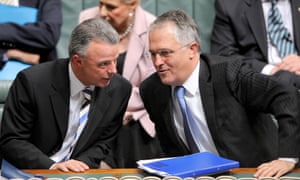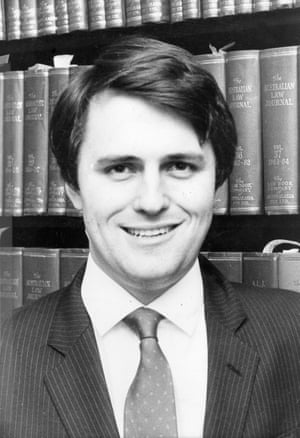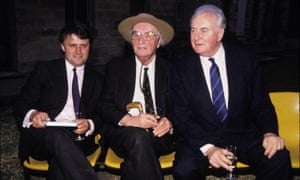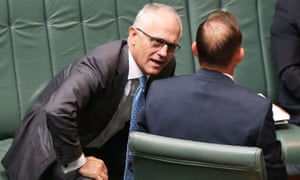Extract from The Guardian
The new leader has been here before, but in the
years since deposing Brendan Nelson, then being deposed by Tony
Abbott, he swapped political impatience for an odyssey of
self-discipline. But three big questions remain.
Malcolm Turnbull with the former Liberal
opposition leader Brendan Nelson. Photograph: Alan Porritt/AAP
Lenore
Taylor Political editor
Monday 14 September 2015 19.13 AEST
Here are three things we need to know about
Malcolm.
A few weeks after Brendan Nelson beat him for the
dog-days job of leading a demoralised Liberal Party after its 2007
election loss, Malcolm
Turnbull called Nelson’s new chief of staff Peter Hendy.
“Turnbull told me that my job was to get Brendan
to resign in the next few weeks because Brendan was hopeless and he
would damage the Liberal brand so much that by the time he, Turnbull,
took over, the next election would no longer be winnable,” Hendy
told me in 2009. “He called Nelson personally with the same
message.”
Turnbull was in such a tearing hurry to fulfill
his unshakeable belief that he should lead the Liberals, and the
nation, that first term opposition did not daunt him, nor party room
defeat, nor the normal parameters of self awareness.
He got there of course, as those who combine great
ability and enormous self regard so often do, but just 14 months
after he won the Liberal leadership in 2008, his party room refused
to back his support for the Rudd government’s emissions trading
scheme and tore him down again. He had told them: “I will not lead
a party that is not as committed to effective action on climate
change as I am,” and after a rebellion led by conservative
climate-sceptics his party replied, “Ok then, don’t,” and
installed Tony
Abbott by a single vote.
Turnbull’s authority and polling popularity had
already been eroded by a fateful error of judgement – possibly also
rooted in his political impatience – when he relied on what turned
out to be a fabricated email from the Coalition’s treasury “mole”
Godwin Grech, to demand the scalps of then prime minister Kevin Rudd
and treasurer Wayne Swan.
A black four months after his defeat he decided to
quit politics and return to his successful business career.
Before the ink was dry on his political
obituaries, he changed his mind – after advice from former prime
minister John Howard. Arthur Sinodinos, now a senator and one of
those who precipitated Monday’s challenge, was another who
convinced him to stay, telling Turnbull “you never know your luck
in a big city”.
But in order to try his luck, Turnbull had to
learn that unlike his previous careers as a journalist or lawyer
(representing and then leaking against media mogul Kerry Packer) or
businessman (making a pile as founding director of internet service
provider OzEmail) or merchant banker, a political career is better
pursued by taking fewer risks and accepting that much lies outside
your control. In fact some political goals can only be achieved by
waiting to see if the chance presents itself at all.
Malcolm Turnbull as a 26-year-old Rhodes scholar.
Photograph: Fairfax/Getty Images
“Getting poleaxed the way I did, unless you are
utterly lacking in any kind of self-awareness, it does a lot of
damage to your self-confidence. These are shattering blows, you can’t
pretend they are not, so you have to regain your confidence, and I am
confident I can make a continuing contribution to Australian public
life. But I have learnt not to plan too far ahead, just to do the
task at hand as best I can,” he told me in 2012.
At first he was angry, venting his rage in
an excoriating blog about Abbott’s climate policy and refusing
to endorse it in television interviews. Then he pushed his luck a
bit with speeches full of big, attention-getting new ideas.
But for the most part the past six years have been
an odyssey of self-discipline, of learning to bite his tongue and
stick either to his communications portfolio or the Coalition script,
whatever he thought of its contents. Six years of building bridges,
and hosting endless backbench dinners, and visiting marginal
electorates. A marathon effort in proving to a still deeply-wary
party that he could be a team player and now a team leader.
Even to the end he was being watched like a hawk,
his every move and utterance scrutinised for disloyalty or plotting
or insurrection, the shock jocks attacking him and blaming him for
everything (on Tuesday Ray Hadley said he was up himself because of
the way he wears his shirt). The prime minister and his office viewed
Turnbull and his advisers with suspicion bordering on paranoia.
But even when the backbench forced the
unsuccessful leadership spill motion in February he did not blink to
publicly declare his hand. As Abbott’s leadership authority
crumbled and poll after poll showed Turnbull was the choice of the
voters, he stuck to the script and professed full support for the
leader. He had to, because to sneak one toe over the line would give
his detractors cause to say “see, he’s at it again”.
As pressure grew, Turnbull supporters began taking
soundings. But the challenge had to be launched quickly and with
minimum collateral damage, to avoid as far as possible the cloud that
followed Gillard for the duration of her leadership because of the
manner in which she assumed it.
So that’s the first thing. Malcolm is the
impatient, crash-through politician who learned to play the waiting
game. The racing intellect who learned to keep quiet. The bull in the
China shop who learned self restraint. Now that he is prime minister
we will discover whether the change runs deep, whether he really
learned his lesson or whether the recent curbs on his impetuousness
have just been a means to an end. And he will learn whether his years
of restraint have really convinced his own party to accept him.
A few days after Abbott deposed him as leader,
Turnbull posted a blog that began like this.
“While a shadow minister, Tony Abbott, was never
afraid of speaking bluntly in a manner that was at odds with
Coalition policy. So as I am a humble backbencher I am sure he won’t
complain if I tell a few home truths about the farce that the
Coalition’s policy, of lack of policy, on climate change has
descended into.
“... any suggestion that you can dramatically
cut emissions without any cost is, to use a favourite term of Mr
Abbott, ‘bullshit.’ Moreover he knows it.”
It was a blast of intellectual fury that a
sensible policy had been scorched by people who refused to believe
science in favour of no clear policy at all.
Malcolm Turnbull with his client former MI5 spy
and author Peter Wright and Gough Whitlam at the launch of the book
Spy Catcher in Sydney in 1988. Photograph: Patrick Riviere/Getty
Images
He has spoken out in defence of climate
scientists, whose work has been derided by many of his colleagues and
even by Maurice Newman, the chairman of Tony Abbott’s business
advisory council, whose believes the world may have entered a cooling
phase.“It is undoubtedly correct that there has been a very
effective campaign against the science of climate change by those
opposed to taking action to cut emissions, many because it does not
suit their own financial interests, and this has played into the
carbon tax debate,” Turnbull said in a speech in 2011.
“Normally, in our consideration of scientific
issues, we rely on expert advice [and] agencies like CSIRO or the
Australian Academy of Science, are listened to with respect. Yet on
this issue there appears to be a licence to reject our best
scientists both here and abroad and rely instead on much less
reliable views.”
He has railed against the “dumbing down” of
Australian debate in general and the debasing of smart policy for
political gain.
“There is a tendency to try to dumb everything
down and turn everything into a one-paragraph press release or even
less, just a slogan. It’s depriving us of a substantive policy
debate,’ he said in 2012, as Abbott, his then leader, was touring
the country chanting “axe the tax” slogan and claiming it would
add “unimaginable” costs to basic goods.
He was contemptuous of Nelson’s small target
strategy even in the early years in opposition, insisting voters
always needed to know what a party stood for, and that it should
stand for big ideas.
Some commentators have argued that Australian
politics is broken because no recent government has been able to
implement a big policy change, without having it undone soon after.
They say the 24-hour media cycle, that amplifies every trivial
mis-step and has little patience for complex argument, the Senate
voting system that throws up obstreperous upper houses and the
negativity of recent oppositions has just made it too tricky to do
anything hard.
But actually, no recent government and no recent
leader has really tried to argue the case for change before an
election and then implement it afterwards and it has been a long time
since voters heard a politician who could clearly explain policy in
words not milled through a focus group.
On Monday, declaring his intention to challenge,
Turnbull said that was exactly what he intended to do – to offer
substance, not slogans, to respect the intelligence of the
electorate.
Malcolm Turnbull speaking with Tony Abbott during
question time. Photograph: Stefan Postles/Getty Images
So that’s the second thing we need to know about
Malcolm. Everyone who wanted evidence-based policy and proper debate
may be about to get what they wished for. Everyone who wanted an end
to the slogans better strap in for some lengthy policy
prognostications. Australia’s continuing capacity to debate issues,
and debate them in the centre, rather than the echo chambers of the
left and the right will be tested.
But that also raises the third big question.
Turnbull has been the people’s choice to lead
the Liberals because he stood out as a politician with the courage of
his convictions. But it is those same convictions - in favour of a
republic, same sex marriage and a climate policy that reduces
emissions in a cost-effective way - that many of his colleagues hate.
The biggest challenge of his prime ministership
will be how he keeps the voters’ faith in his conviction-politician
credibility, and also the faith of the party room who elected him and
could depose him at any time – just like they did last time.
His most difficult balancing act will be the same
policy that brought him unstuck last time. He has promised his
party’s right flank that he won’t re-introduce an emissions
trading scheme and will wait and see what the existing “Direct
Action” policy achieves, interpreted by some as capitulation.
As
I have reported before, the Direct Action scheme has embedded
within it mechanisms that could be “dialled up” – by a
government that was willing – to make it more much efficient and
effective, essentially by turning it into a baseline and credit
trading scheme. Turnbull’s challenge is whether he can do that over
time, while answering Labor’s charge that he has sold out and
without alarming his own backbench that he is bringing in his old
policy by stealth.
He is social policy moderate, a republican who
accused Howard of breaking the nation’s heart with the tactics that
saw the 1999 referendum fail, and also a libertarian. Free speech was
at the heart of the Spycatcher case, which shot him to fame as a
brash young lawyer, and at issue when he took Julia Gillard to task
for saying Julian Assange had broken Australian law by publishing the
Wikileaks cables. (One of them recorded now Abbott-critic Mal Brough
telling the then US ambassador that ‘Turnbull was only interested
in Turnbull”)
But Turnbull is also a businessman and a true
believer in free market economics. Any left leaning voter who thinks
common ground with Turnbull on climate change and gay marriage will
mean they agree with most things he does is probably in for a
surprise.
On same sex marriage he has told colleagues he
will stick with the plebiscite determined during the recent marathon
party room meeting, but is likely to bring it forward.
That’s the third thing we have yet to find out
about Malcolm. Can his party, and the electorate learn to accept the
substance of his agenda. Could he possibly govern from the centre
while leading a party that has veered to the right?
He had a long time to think about the mistakes he
made in 2009. He has a lot to prove. His return would only be a real
vindication if he succeeds.




No comments:
Post a Comment